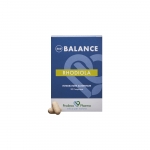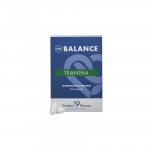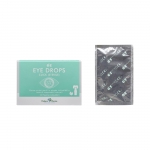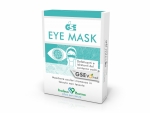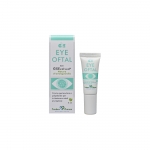Ours is a holistic approach that does not hinder the physiological processes of the body. It's an approach that encourages the restoration of balance, by combatting the causes of symptoms as efficiently as possible and ensuring fast relief.
Symptoms and relief
SELECT YOUR NEED

Eyes
EYE HEALTH
THE EYE IS A SYSTEM IN DYNAMIC EQUILIBRIUM, PROTECTED BY A VERY IMPORTANT BARRIER: THE TEAR FILM
The tear film is a thin , fluid layer that covers the outer surface of the eyeball and plays a vital role in eye function. The stability of the tear film is vital for eye health.
It performs an OPTICAL, TROPHIC, PROTECTIVE, LUBRICATING AND CLEANING function.
THE STRUCTURE OF THE TEAR FILM IS QUITE COMPLEX AND CONSISTS OF 3 LAYERS:
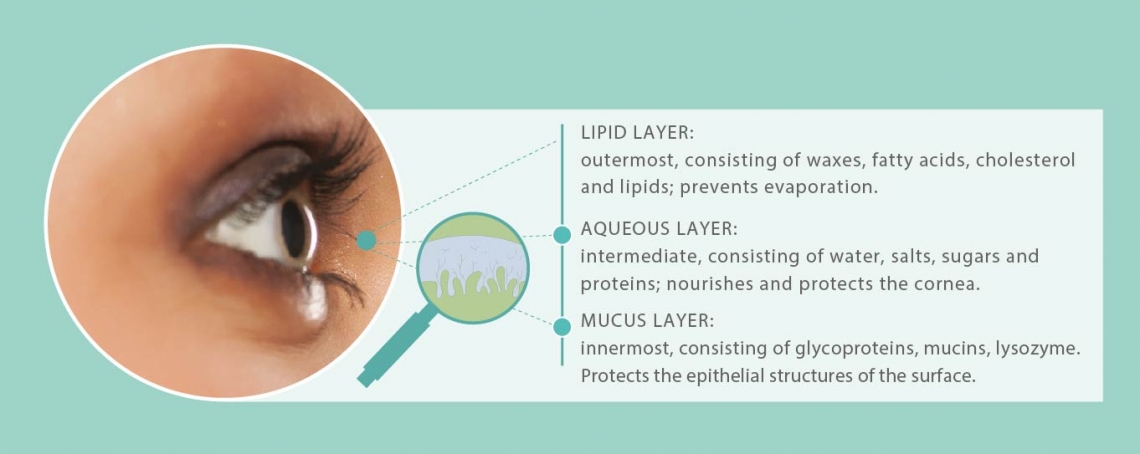
THE FACTORS AND SYMPTOMS THAT CAUSE TEAR FILM IMBALANCE ARE ESSENTIALLY:
ENVIRONMENTAL AND PHYSIOLOGICAL
- dust, moisture, pollution (allergens)
- environments with artificial light
- particular hormonal conditions (menopause)
- taking particular medications
- (antihistamines, oral contraceptives)
- prolonged use of contact lenses
- allergies, thyroid changes, etc.
SYMPTOMS
- burning sensation
- irritation
- light sensitivity
- abundant tear production
- itching
- contact lens intolerance
- redness of the conjunctiva
- visual fatigue

IMPAIRED TEAR FUNCTION CAN PREDISPOSE YOU TO VARIOUS DISORDERS, SUCH AS:
EYE PATHOLOGIES FROM CONTACT LENSES
(KERATITIS, CORNEAL ABRASION, DRY EYE, IRITIS)
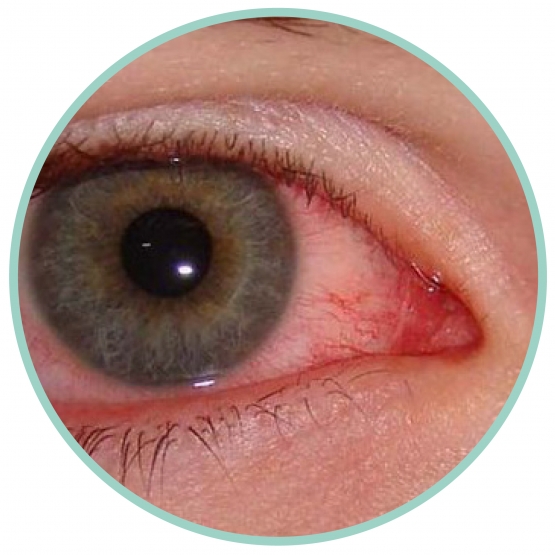
CONJUNCTIVITIS
(BACTERIAL, FUNGAL, VIRAL, FROM CHEMICAL/PHYSICAL AGENTS, ALLERGIC)
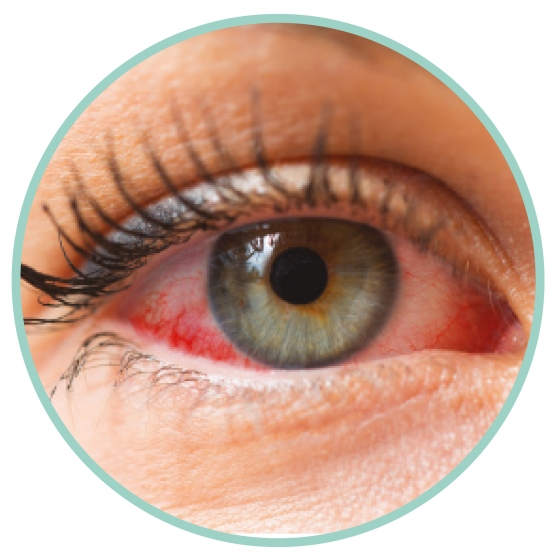
DISORDERS OF THE EYELIDS AND THE AREA AROUND THE EYES
(CHALAZION, STYE, BLEPHARITIS, DACRYOCYSTITIS, EYELID DERMATITIS)
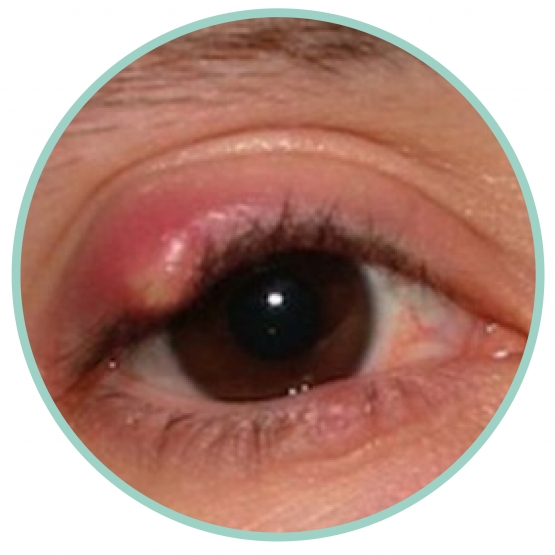
Stye is an acute inflammation of the sebaceous glands located on the eyelids and/or eyelid rims. It can form on the outside of the eyelid when it affects a Zeis gland (a sebaceous gland located at the rim of the eyelids), or more internally when it affects a Meibomian gland (an excretory gland located on the upper eyelid with the function of secreting the lipid component of the tear film, which has the role of protecting the cornea and controlling the evaporation of the aqueous layer of tears).
Stye generally manifests with pain, redness and the appearance of a small, round, hard and painful area. Abundant tear production, photophobia and the sensation of the presence of a foreign body may be present. A yellow dot, indicative of suppuration, appears in the center of the stye (at maturity).
Internal stye is more rare. In such cases, pain, redness and edema are more localized and there is a frequent tendency to become chronic, with the formation of an abscess that often develops within the thickness of the eyelid. It can be linked to a staphylococcal bacterial infection and can be generally associated with blepharitis.
Grapefruit seed extract (GSE)
Grapefruit Seed Extract (GSE) works as an extraordinary "selective cleanser," acting without affecting the microbial flora of the mucosas or harming ocular function. GSE is an ideal remedy for ocular and eyelid disorders of a viral and bacterial nature.

Chamomile
Chamomile has been used for centuries as an anti-inflammatory and antioxidant in the treatment of eye infections and eye disorders, including clogged tear ducts and conjunctivitis. Eye drops containing Chamomile extracts have a proven protective and anti-inflammatory effect on human corneal epithelial cells, and can protect them from UVB-induced cell death, improve wound healing, and, finally, exert a potent antioxidant effect.
Marigold
Marigold has a rich phytocomplex of triterpene derivatives, flavonoids (quercitin, rutin, astragalin), mucilages and carotenoids, thanks to which it has exceptional anti-inflammatory and decongestant action, providing relief from burning and eye irritation.
Hyaluronic acid
Hyaluronic acid is a glycosaminoglycan that plays a crucial role in the physiological processes of tissue repair and regeneration. In vitro studies have shown that Hyaluronic acid can stimulate growth factors and cytokines necessary for the healing process through specific interaction with receptors present in fibroblasts and endothelial cells, while reducing bacterial contamination and the risk of infection. It also has muco-adhesive and barrier-forming properties.
Polysaccharides from tara and red seaweed
These polysaccharides are able to form a strong, flexible and non-occlusive film that mimics the barrier functions of the skin. In this way, they protect against pollutants (-47%), irritants (-22%) and allergens (-62%) while maintaining the skin's natural properties. The protective effect of this ingredient was studied in a reconstructed 3D model of the inflamed epidermis with altered barrier function. The treatment has a proven ability to reduce the adhesion of pollutants and allergens, and also that of bacteria.

Carnosine
Carnosine is a dipeptide consisting of alpha-alanine and L-histidine. Thanks to its antioxidant action, it is particularly indicated for protecting against oxidative damage induced by sunlight (UVA, UVB, visible light and infrared rays) and aging, increasing skin elasticity and firmness.
Carnosine protects against the effects associated with exposure to UVB rays, which, just like UVA rays, cause oxidative damage to DNA, collagen degradation and hypopigmentation, especially in the epidermis. It also protects cells from the consequences of exposure to visible light, particularly blue light (400-500 nm), which is the only portion of the visible spectrum that can induce oxidative damage and hyperpigmentation.
Plants waxes from jojoba, sunflower and mimosa
Thanks to their lipophilic and non-occlusive nature, plant-based waxes effectively contribute to decreasing transepidermal water loss, thus exerting a barrier and soothing effect on the skin. The synergy between the oils and waxes in the emulsion has a protective effect, promoting the optimal level of skin hydration and thus restoring the hydrolipidic skin film to its healthy state.
Witch hazel water
Witch hazel is a well-known medicinal plant with soothing and refreshing properties. It has been used in the past to treat eye irritation due to long exposure to light. Thanks to the presence of tannins in the leaves and bark, it is used in herbal medicine for the preparation of fluid extracts and ointments with decongestant and astringent properties.
Glyceryl caprylate
Glyceryl caprylate is the ester of caprylic acid and glycerin and has a moisturizing and barrier effect. It is also used as a preservation booster as it can inhibit the growth of some bacterial species, such as S. aureus. In addition, it can stabilize emulsions and improve the feel of the skin. It reduces whiteness effect and oiliness, increasing silkiness and giving a velvety after-feel.
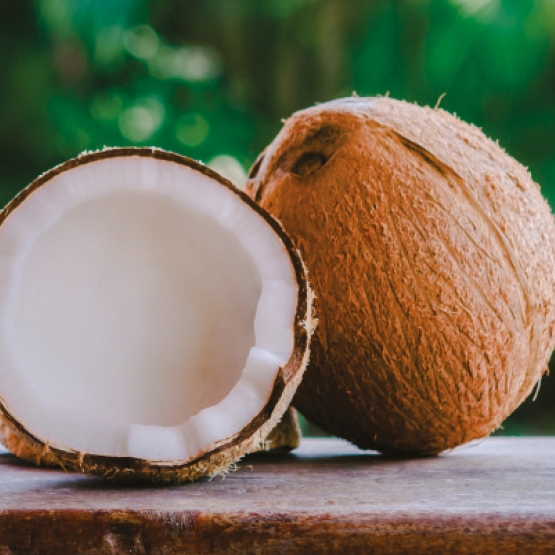
Marshmallow
Marshmallow is a medicinal plant that is particularly popular for treating the irritation of the ocular mucosa. Its roots have a high percentage of mucilage, which tends to form a thin protective and moisturizing layer over the skin. As a result, it is excellent for brightening and soothing reddened and dry eyes and eyelids.
Elderberry
Elderberry flowers are highly prized for their anti-inflammatory action, thanks to the flavonoids they contain (canferol, astragalin, rutin, quercitin, isoquercitin, hyperoside), which can modulate cytokine secretion and reduce the activity of proinflammatory interleukins. In addition, it also has a soothing effect thanks to mucilage and an antioxidant action that protects the skin from stress induced by UV light, pollutants and fatigue, which ensures the reduction of dark circles and bags under the eyes.
Green algae
Green Algae extract has a decongestant and reactivating effect on microcirculation, reducing the presence of periocular swelling. It has also been seen to increase the expression of collagen 1 and collagen 3, giving tissue greater elasticity.

Eyebright
Eyebright is a medicinal plant with prominent and widely-recognized traditional use in the treatment of ocular disorders, including ocular allergies. The most significant constituents of the phytocomplex are the iridoid glycosides (aucubin in particular), which have an excellent soothing action due to their ability to decrease the production of cytokines (such as IL-1 beta, IL-6, TNF-alpha) at the corneal cell level.
